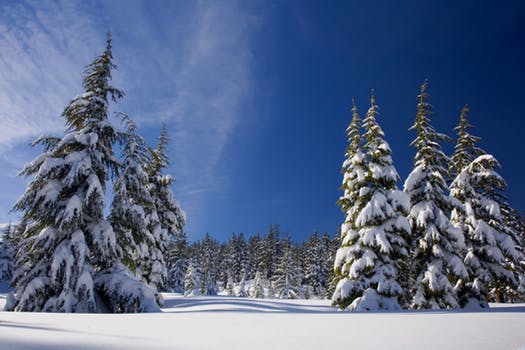The survivability of trees during frigid, sub-zero temperatures can seem like a mystery. During the winter, why don’t they don’t freeze like other, more fragile plants?
Trees, just like animals, are capable of adapting to different and hostile environments. Trees don’t freeze solid in the winter because they have a process to survive cold climates. If ice develops within the cells of the tree (if water inside the cells freezes), it can mean death. Trees have different processes to handle this situation, by controlling where ice forms.

In cold climates with “milder” weather (those with temperatures that don’t drop much below -20 Celsius), some trees can isolate vulnerable cells from ice “nucleators” that cause water to freeze. Some trees’ cells create proteins and sugars that serve as a kind of “antifreeze.”
In more extreme climates, some trees do something called “intracellular freezing” to help them survive in temperatures up to -80 Celsius. In this process, the tree produces protein molecules that cause ice to crystallize around them. These molecules are produced in spaces between, but not within, a tree’s cells. When ice starts forming in those intercellular spaces, the frozen water attracts liquid water. The ice between the cells also attracts moisture from inside the cells. The material left inside cells is nearly dried out; it can’t freeze anymore. This is the point when a tree has fully adapted to the new temperature.

Trees need time to prepare for the winter. Longer fall nights send a message to trees that it is time to go dormant by shutting down cell growth activity and dropping leaves. When the temperature drops a little below freezing, trees continue their preparation for colder weather.
Here are some other factors that help trees survive extreme cold:
- Trees are soft and flexible, to a certain degree. The tissue of the tree can “stretch,” so they don’t burst (like pipes) during winter.
- Trees take time preparing for colder temperatures. The cells of most trees get rid of their water content. They usually enter a dehydrated, dormant state to survive.
- Some trees produce more sugar. When this sugar dissolves in water, it can lower the water’s freezing point and act like a sort of “antifreeze.” Maple trees do this.

Winter is a challenge for all living things, including trees. How trees adapt to these climates is complicated and intriguing.
Caledon Treeland understands many of the mysteries of trees; we have a beautiful selection of trees that can survive the Ontario winters. Call us at (905) 880-1828.

